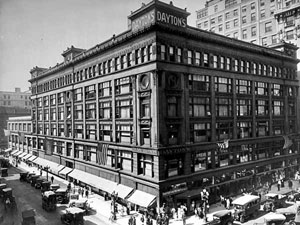|
Audio
Photos
More from MPR
Your Voice
|
'An extraordinary bond'
March 11, 2004
 |
| Dayton's Department Store in downtown Minneapolis around 1915. (Minnesota Historical Society) |
Minneapolis, Minn. — It was 1902 when George Dayton and son opened their first dry-goods store in downtown Minneapolis, facing off against the established Donaldson's Department Store across the street. But it wasn't long before Dayton's established itself as a name to be reckoned with, and for more than a hundred years the chain grew along with the Twin Cities.
"The bond between Dayton's and the people of Minnesota is an extraordinary one," says Karal Ann Marling, a University of Minnesota professor of art history and an expert on Minnesota pop culture.
 | |||
She says Dayton's brought high fashion to the Midwest. Through the years the company reflected Minnesota in its ads and catalogs, and put community art on its shopping bags. Marling says elaborate window displays, flower shows, and Christmas events in Minneapolis created lasting Minnesota images.
"Old Minnesota families all in their matching Nordic sweaters, with the little ones by the hand, having come to Dayton's to see the annual walk-through and waiting to have their festive lunch together. Several generations of families. It would be sad if that were to turn into just another big-block department store," she says.
The Dayton's bond was powerful enough to move the Minnesota Legislature. In 1987, the chain faced a hostile takeover bid by a Maryland-based holding company. Lawmakers convened for a special session to strengthen Minnesota's hostile takeover laws in Dayton's favor.
Former Gov. Arne Carlson was state auditor at the time. Largely because of its philanthropy, Carlson says there was no company in the state more worth saving.
"They were extraordinarily generous," he says. "They provided tremendous leadership to our communities. And I thought this was an appropriate act by Minnesota's political system, and that was, 'Hey, what can we do to keep this home-grown corporation in Minnesota?'"
Carlson says the store remains as strong a state symbol as he can think of. "As the loon, as our lakes, as Gopher football, what have you. I still go to Marshall Field's and I still refer to it as Dayton's, and as long as I live, if there's a store there I'll call it Dayton's."
Others think much of the Dayton's aura disappeared three years ago, when then Dayton Hudson stores took the name of their Marshall Field's subsidiary. The company said Marshall Field's was a cosmopolitan brand that would resonate with shoppers worldwide. But to local observers, like art historian Karal Ann Marling, it was a blow.
|
When the Marshall Field's name went up on the beautiful old store, I think there was already a sea-change in progress in retailing in this state.
- Karal Ann Marling |
"I think a lot of what Dayton's was is gone already. When the Marshall Field's name went up on the beautiful old store, I think there was already a sea-change in progress in retailing in this state," she says.
If the Dayton's image suffered from the change, its habit of philanthropy did not. Giving by the Target Foundation, supported mostly by sales at Target stores, continued to increase. The foundation gave $9.5 million in 2002.
Marshall Field's is the biggest corporate sponsor of the Minneapolis Institute of Arts. Development Director Joan Grathwol Olson says the label may change, but the money all comes from the same place: the Target Foundation.
"We know they're a strong supporter, we know that the funds come form the profits, we know that 95 percent of the profits come from the Target division as opposed to the Marshall field's or Mervyn's division. So just doing the empirical analysis, I would not imagine that there's going to be a significant impact on this community or this organization's funding," according to Olson.
A Target spokeswoman says the foundation would not change its five percent giving commitment or its giving priorities in the event of a Mervyn's and Marshall Field's sale. If, as expected, a sale actually boosts Target Corporation income over the long-term, corporate giving would increase along with it, ensuring that at least one aspect of the Dayton's tradition lives on.
|
News Headlines
|
Related Subjects
|
